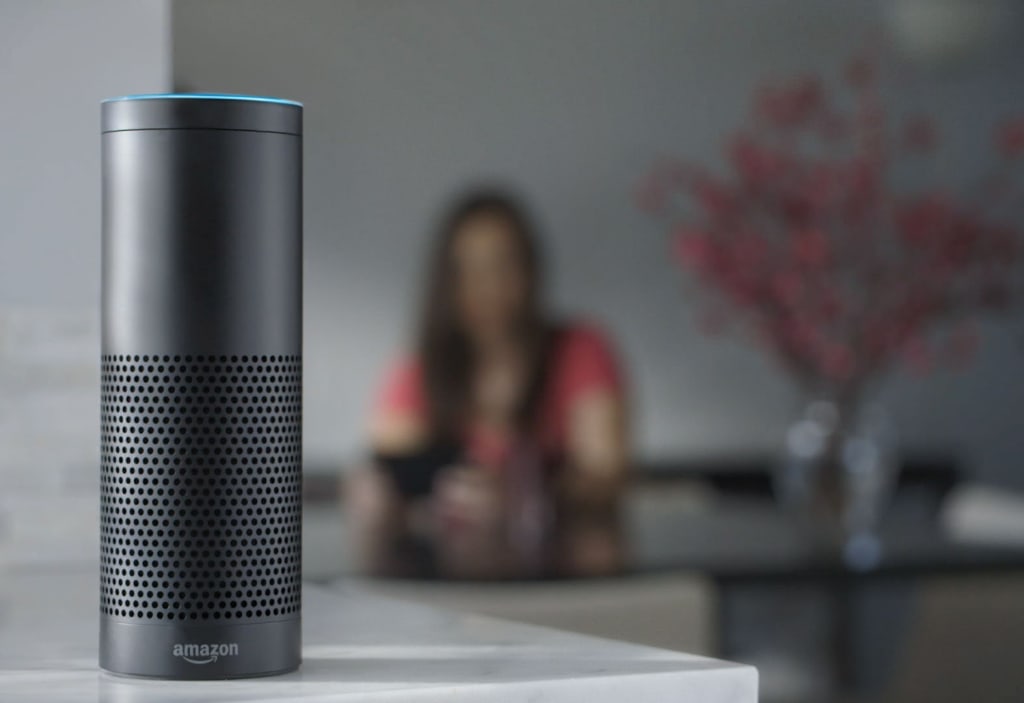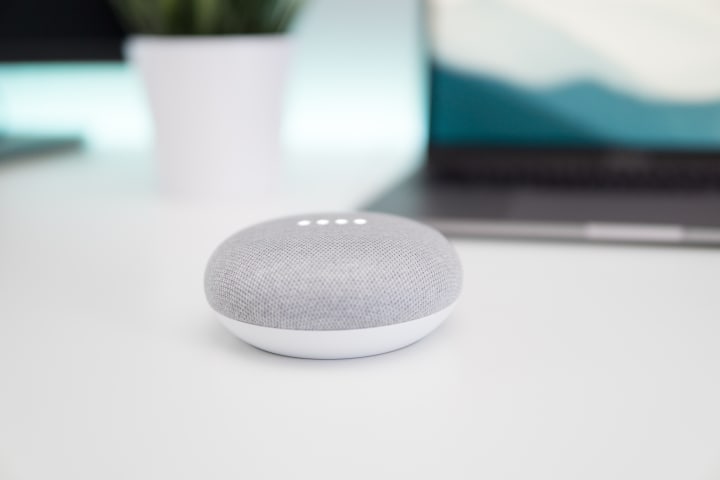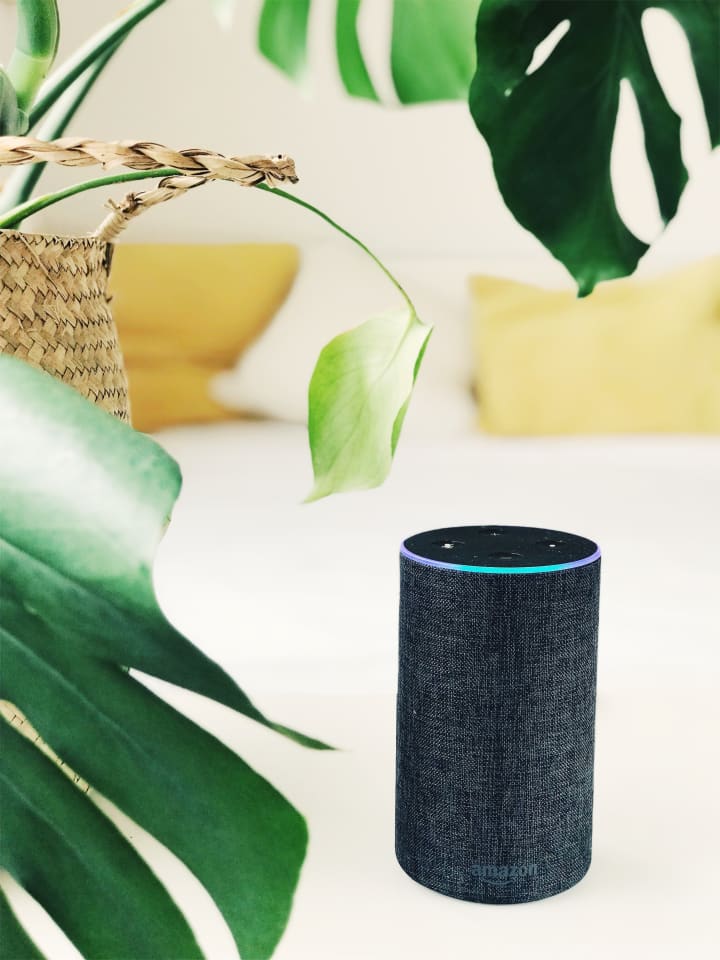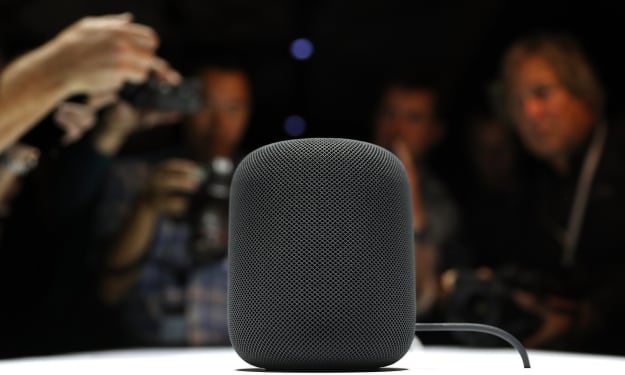Part 2: Alexa, Buy Me... Anything!
Smart speakers are a fast-rising, exciting new technology. However, the big question for marketers is when—and if—consumers will really start using them to order all our "stuff."

In the first half of this article series, Part 1: Alexa, Buy Me... Anything!, we explored the numbers behind what will undoubtedly ultimately be one of the biggest trends not just in the way we interact with technology, but yes, in the way we shop for all of our "stuff." This is the advent of smart speakers—the Alexas, the Google Homes, HomePods and the like—the devices that you can simply ask a question and "shazam!"— it speaks the answer!
And with smart speakers comes the advent of yet another letter to add to the word "commerce" that will become part of our lexicon. As with e-commerce and m-commerce that came before it, now, much of the buzz in the C-suites in the tech and retail worlds is coming to be know as "v-commerce"—short for what is forecast to become perhaps the trending topic over the next few years—vocal commerce.

Photo by Kevin Bhagat on Unsplash
With tens of millions of smart speakers already sold and installed in the U.S., and with forecasts for demand to explode both domestically and internationally in the near future, companies are very interested today in exploring the vast potential voice-enabled technologies have to revolutionize the way we interact with our devices. As was detailed in the first article, there are literally limitless ways that creative users can use these smart speakers. With increased utilization and market penetration, many, many possibilities exist for companies to leverage the voice technology in these devices—and those that will inevitably be introduced in the coming years in the latest and greatest versions to come—and position smart speakers as one of the most dynamic emerging technologies to have be recently brought to market.
Now unless you were marooned like Tom Hanks in Cast Away on a deserted island without any Internet or TV access, you could not help but notice a significant marketing trend during the just passed Christmas Season of 2018. This is the fact that smart speakers were being touted as the "next big thing" by the industry giants that are behind much of the voice-enabled tech brought to market thus far—namely some small outfits called Amazon, Google (Alphabet), and oh yes, Apple. Remember, as was reported in Part 1, 10 of the top 10 selling devices are marketed by these three firms and account for over 80 percent of the smart speaker market today!
Smart speaker marketing has been geared to convince consumers not just that these are new, suddenly indispensable devices that will revolutionize the way you live and learn about the world around you (well, what the weather is like if you choose to venture outside of your increasingly smart home). No, these devices also have the potential to change the way we buy things—and that presents a world of possibilities for growth in this area of v-commerce, with ordering "things"—and even services—by simply speaking your wishes.

Photo by Jan Antonin Kolar 🇨🇿 on Unsplash
And yet, as we saw in Part 1 of this article series, consumers—unlike Macaulay Culkin's adult, alone in the family home (again) "Kevin" character—are generally being slow to move to voice-based buying—certainly slower than the Amazons, the Googles, and the Apples of the world might have expected—and certainly slower than they want you to be as we move into the years ahead with the expected proliferation—and mainstreaming—of these devices into our homes and our workplaces.
We are certainly still in the early adoption phase for smart speaker technologies in the diffusion of innovation curve for voice-enabled tech. In my opinion, as a strategic management consultant and professor, I see several challenges and opportunities ahead for the growth of v-commerce as we progress through the development and deployment of vocal-based tech in general, and voice-based shopping in particular. How companies—and how consumers—choose to deal with these issues will go a long, long way to determining the critical "How high?" "How fast?" "How widespread?" and "How much?" questions that always come with the adoption curve of a radical new technology. And since smart speakers are forecast to play a big role in the future of how we shop, these questions are absolutely crucial for companies—in tech, in retail, and beyond—to get a firm grasp on today in order to prepare for what will likely be the rapid growth of vocal commerce in the coming years.

The Challenges to Vocal Commerce for Companies
So, let's deal first with the very real challenges that could slow the march of voice-based technologies into our lives and our homes and dampen the potential for growth in the realm of vocal commerce. I will categorize these issues and concerns into three general areas. These are:
- Security,
- Trust, and
- Value.
Each of these matters are huge, critical, strategic issues—game-changers—on both a corporate and an industry-wide level. Therefore, they will only be framed and discussed briefly here in the present article to help guide readers and to stimulate debate in this area. However, in the near future, I do intend to revisit each of these subjects as further entries in this series of articles exploring the rise of vocal commerce.
Vocal Commerce: The Security Issues
Nothing, nothing is a greater challenge to the use of smart speakers in general and the potential growth of vocal commerce than the issue of security. In fact, most of the possible real roadblocks to the really wide adoption and thorough penetration of voice-controlled shopping and v-commerce fall into this category. By security, I would posit that we are talking about the security of the smart speaker from hacking or any other form of manipulation by an outside, unintended party.
As we have seen with almost any form of new communications technology that has come down the pipe to date, those seeking to take advantage of the vulnerabilities of the tech will find ways to do so. And this is not just true with the latest and greatest technologies, with everything from RFID (radio frequency identification) and the "Internet of Things" to self-driving smart cars. Think about it, before we had hackers—both from this country or from an ocean away —who could break into your personal computer, your laptop, your tablet or your smartphone and access it and maybe an entire network—we routinely had peoples' credit card info and more stolen simply by people listening to them talk on the phone—or just looking over their shoulder as they dialed a number or entered their personal info on the phone's keypad.
The lesson here is that all new technologies are vulnerable to nefarious actors, whether they be good old American criminals or Russian hackers. And in the case of smart speakers, these devices are particularly attractive—and vulnerable—to hacking because of one word: location. As with real estate, it truly is "location, location, location" when it comes to the critical need to secure these devices. That is because smart speakers are in the home. And remember, in many cases, there will be 2, 3 or more such devices in one family home. Thus, they are centrally located precisely where we spend more and more of our time and live much of our lives - and where today, we conduct a considerable portion of our personal and even work business.
The smart speaker then is seen by those who might want to gain access to your smart home, your home network, your computers and other electronic devices, and yes, your Amazon, Google, and/or Apple accounts and more as a gateway to the promised land for them. And with cases of smart speakers being hacked hitting our 24/7 news cycle and rightly causing concern over the security of these devices, this is something that the makers and marketers of smart speakers will have to closely monitor and try—yes, try—to take proactive action on before—or at least when—vulnerabilities are inevitably found and exploited by hackers. To Amazon's credit, they have received some accolades for having taken steps against specific hacking vulnerabilities, but as with all forms of IT security, it is a constant and ever changing challenge for even the biggest and best of tech firms to stay abreast with—let alone ahead of—the hackers who will seek to exploit the new technologies for their gain.
Vocal Commerce: The Trust Issues
Closely related to the issue of hacking and security is the trust issue for consumers, and in this case, the principal trust concern centers squarely on the issue of privacy. Just as you might be opening up your home, your network, your life to a nefarious actor who could hack into a smart speaker, that same device provides a ton of data on you, your family, your habits, your behaviors, your interests—basically your entire life—to the companies affiliated with the device - namely little tech outfits like Amazon (Alexa), Alphabet/Google (Google Home) and Apple (HomePod). As captured in the video below featuring an interview with Nicholas Thompson, the editor of Wired Magazine, the privacy challenge posed by these devices in the home is perhaps unlike anything we have encountered in the past. Plus of course, as invariably happens with the introduction of new computing and communication technologies, the rules, standards, and laws have not - and will not - evolve fast enough to keep pace - even a close pace - with the privacy concerns of users of smart speakers.
The trust issues associated with smart speakers to me are twofold, but they are inexorably related. First, there is the issue of surveillance. These devices are built to listen for you, and as such, they have to be—by design—always on and always listening. What specifically they record and how that information is managed, compiled, analyzed, used—and perhaps even shared and sold—by the company is a huge issue with smart speakers. This makes the management of personal data—or rather, the real potential for the mismanagement of it—the second big trust issue that must be dealt with by all companies operating or seeking to enter this space. And with the waning of the public's trust in the ability of big tech companies to properly use and secure their personal information based on high profile cases of mismanaging user data—i.e. Facebook—the trust concerns will not easily be put behind.
Even more worrisome for big tech is the fact that as smart speaker penetration grows in American households and vocal commerce really takes off in a big way, the trust issues will come even more to the fore. Indeed, each time a well-publicized case happens—and they will inevitably happen—this can shake the trust that a smart speaker user has to have in the technology and the company behind it to even have the speaker in their home and to have it be active. Such instances in the future could indeed set back quite a bit the overall adoption cycle for the technology—and specifically the growth of shopping on such devices.
Vocal Commerce: The Value Issues
The final big, umbrella issue of concern over the adoption and use of smart speakers and the development of vocal commerce in particular can be summed-up in one word—value. While not probably on par with the fundamental security and trust issues in terms of the general course of smart speaker penetration and adoption, the value issue will be critical to the development of voice-based buying, and thus, v-commerce overall. Fatal security flaws with a particular system—or a lack of user confidence in smart speaker systems in general—could really slow or bring to a complete halt the development of the smart speaker market. However, if consumers come to believe that shopping on a smart speaker does not bring the equivalent pricing and value as shopping on a more traditional screened device—a computer, a tablet, or a phone—then that could, and likely will, keep a good percentage of people from ever using—or continuing to use—smart speakers for buying all the "stuff" that goes with modern life.
One of the hallmarks of online shopping to date has been, well, that it is shopping. Shopping means comparison, and whether vocal commerce will be able to "deliver the goods"—at a satisfactory price in the minds of consumers - will be a challenge for each of the dominant players in the marketspace—Amazon, Alphabet/Google, and Apple. If consumers perceive that there is a v-commerce premium—e.g. paying a higher price for a bag of dog or cat food or a 4K TV buying it through their smart speaker as opposed to on their smartphone, then there is a significant percentage of the potential market that would choose not to try—or to continue to use - the v-commerce channel.
For all of our love today of being able to buy anything from the comfort of our sofa while watching anything we want on Netflix, there are a whole lot of people who would choose to not buy anything through their smart speaker if they perceived that it would cost them more than buying through more "normal" means—whether that be online or offline. Further, any perception that they were being limited—in choice, in price, etc.—in their choosing to shop through conversing with their smart speaker might mean that some percentage of potential and actual v-commerce shoppers might only use their voice to reorder or replenish items they had previously bought through the same vendor. Also, one of the default issues thus far with smart speaker shopping is that basically, in your buying activity, you are locked into a certain company's (Amazon, Google) supply chain partners and relationships—or its ecosystem (Apple). That too brings up the question of value in many consumers' minds. Finally, you would not want to be perceived as the "last chance technology," one that is only used by those who cannot shop through other means—i.e. those who are not computer literate, those who do not have the right device, those who are elderly and/or infirm, and yes, those who would only use their smart speaker to shop in an absolute emergency.
Vocal Commerce: Dealing with the Issues
Now with this list of potential downsides for the growth of the smart speaker market and vocal commerce in particular—centering on security, trust, and value concerns, you might come to the impression that I am bearish on smart speakers in general and voice commerce specifically. My expert opinion is that yes, while there are significant risks and obstacles facing this emerging technology that could indeed undermine the progress being made in these markets and their overall growth potential, voice-based buying will be huge, and it will indeed be a new channel for commerce—v-commerce—as we approach 2020 and well into the future.
There are real risks and obstacles in the smart speaker area, and yes, they need to be continually monitored and addressed. And yes, when "something" impacts one device and the company associated with it, that will impact the entire "smart" market—even beyond just smart speakers themselves. Thus, there should be—as much as practicable and yes, legal—cooperation between Amazon, Google/Alphabet, and Apple on issues of mutual concern. The alternative, of course, is governmental action, and as we know from prior attempts to regulate developing technologies, most often such efforts are too much and too late. Quite often in fact, such well-intentioned efforts can produce significant—and significantly negative—unintended consequences. However, I do believe that all of these forces are manageable and with proactive measures, particularly by the "Big 3" players in the market today, we will see a continued, rapid uptake in both smart speakers becoming an integral part of our homes and yes, help facilitate v-commerce to become a viable, thriving new retail channel.
Vocal Commerce: Convenience - The Positive Driver for Companies
On the positive side, I see the driving force in v-commerce for consumers—and therefore for the companies seeking to serve them through their smart speakers—being centered around one thing. That is simply the convenience of voice-based shopping.
Brushing everything else aside, there is simply no easier or quicker way to find and buy something online than through vocal commerce. You want something, just say: "Alexa: Get me... anything!" and it will be ordered. No entry, no typing, no comparing, no swiping. Just speak the magic words, and it is done. There really can't be an easier, more convenient manner of shopping than v-commerce. And for those of us of a certain age, shopping by simply speaking what you want would seem like something straight out of The Jetsons vision of life in the 21st century.
Is v-commerce right for everything? The answer is clearly no—at least as of now. Based on the present level of smart speaker technology, vocal commerce does limit the user to not really being able to compare items or do any deep research into a purchase decision. The biggest benefit is then convenience, and that works best for routine purchases. Namely, this means that as of today, v-commerce is best suited for repeat orders, for replenishing what are essential, stock items, and for buying what would be simple commodity items, and in particular, low dollar purchases.
Let's put this into perspective. Say that you hear a song on your smart speaker and ask Alexa or Siri to buy that music for you. However, would you buy your next iPhone on which to play your new favorite song in the same way? And would you buy the car that you would drive around while listening to your new favorite song on your new iPhone? Likely, almost everyone today would say "No" as we progressed through from simple transactions to higher dollar and more complex, critical purchases.
And so the challenge for companies will be how to expand beyond the present "use case" for vocal commerce of reorders, replenishment, and low dollar, commodity items. If the tech giants themselves can expand the functionality offered to consumers in the smart speakers themselves, this will go a long way to promote greater utilization and market penetration of these devices.
Anything that can be done to help guide a smart speaker user through a buying process that can help assure assure the buyer that he or she will have a selection of items across which they can make intelligent, valid comparisons and make an optimal decision—based on the unique wants and needs they have for a particular purchase—will help foster more adoption and use of vocal commerce as a new personal purchasing channel. Just the integration of a screen into the latest versions of the Amazon Echo and the Google Home Hub will greatly help the buyer to have more the feel of a shopping experience than simply saying "I want X." Being able to compare "X Y, and Z"—when a comparison is warranted—makes buying "X" far more likely than the present interface.
However, I firmly do not believe that a screen is necessary to make v-commerce really rock, as Gary Vaynerchukhas famously trumpeted for over a year now, that "voice is the new search!" The better we can make voice-based search work overall—and to specifically make it work better for us as we make buying decisions—the more voice search, as we do routinely with Siri on our phones, will be the default search method. This will be particularly true for younger audiences, who may indeed come to rely on voice search almost exclusively. Shopping as search, even for more complex items, can certainly be done on a purely verbal basis. Whether it is the tech giants themselves who develop these new ways of searching for products and interfacing with the smart speaker, or whether it will be app developers - even perhaps bot developers—who can find ways to make all of this work better for consumers, these will be the real "winners" on the path to v-commerce.
Now, when it comes to convenience, one issue that companies will be focusing on is how to get there products to best appear as selections in a voice search environment. When you think of it, there is a correlation here between the physical shopping environment and the digital one. For companies and brands, they want their products to be featured and perhaps even given preference in search. And so just as firms routinely pay for Adwords to appear higher in traditional web searches, so might—or really, so very likely—will be the case with voice-based search shopping. This does make sense, as in a search environment, paying to be better ranked as a product selection is almost the digital equivalent of grocery store slotting fees.
You want to be in the featured spot when consumers are searching for something, whether the customer is in a physical store or talking with a speaker. In the v-commerce world, if I'm a company selling dog food, I want to be the first choice that is provided as the result of a voice search. So if I am an executive with Iams, if a customer tells the smart speaker they need dog food, then I want the device to respond with "Oh, you need dog food, Iams is on the way..." Thus, such costs, whether they be ads, fees, or go by another name, will certainly be an issue for v-commerce moving forward. They will serve to creating yes, a new revenue stream for Google and Amazon, but also raise costs for companies seeking to do better with vocal commerce. In the end, while they can improve and streamline the search process, they likely will add some costs—and perhaps some friction—to the vocal commerce process.

One prospect that I forecast to develop in the near future is that there will be smart speaker opportunities for major retailers—beyond Amazon and Google to offer their own "branded" devices. Certainly, as v-commerce grows and expands, major retailers like Walmart, Target, Costco and more are not going to stand idly by and let all the voice search activity—and thus, the revenue that will come through the vocal commerce channel—to be simply divided between Amazon, Google/Alphabet, and, to a lesser extent, Apple.

And so how long before you could be offered a "free" smart speaker from a major retailer? These could be offered by stores like Walmart, Target, Best Buy and more—or even your major grocery store chains with size and scale to do so—like a Safeway or Publix? There would look to be so much opportunity for retailers—particularly the "generalists" (i.e., big box stores and grocery stores) and in the health care area in particular (CVS and Walgreens) to take advantage of vocal commerce, and the best way to do so would be to offer their customers a way to use their "ecosystem"—perhaps pairing it with their loyalty/rewards program and offering special incentives for trying—and staying with—vocal commerce. Taken to an even higher level, the possibilities again are—well, limitless. With CVS Health's recent almost $70 billion dollar acquisition of the health care insurer/managed care provider Aetna, one could easily envision tie-ins between a CVS smart speaker and other forms of health monitoring - and lead to wellness "advice" or "counseling" through the speaker beyond actual purchases.
In the end, there certainly are some very intriguing possibilities for companies to create value for themselves by creating new forms of value—and providing values on products—for consumers as they begin to venture into the realm of vocal commerce. And the ones that we can think of today will likely pale in comparison to what we may actually see in practice in 5-10 years. In the end though, the critical factor as companies venture into the realm of v-commerce is to find new ways to reach and to connect with customers in a new way. It is not enough to just "shift" buyers from making purchases on other devices to buying through their smart speaker. If that is the case, firms may find that their vocal commerce efforts may not produce satisfactory returns, merely shifting, rather than building sales. In the end though, providing customers with utility from shopping using voice search with their smart speakers will drive both usage and adoption of this technology.

Finally, one must conclude that time is indeed on the side of vocal commerce. A new rising generation of younger people—even school age children—will drive shopping adoption as they come to rely on smart speakers for, well.... everything. Talking to and interacting with a speaker will not be a new or foreign activity as time goes by. And eventually, we will have "vocal search natives" who will likely only know this form of search. And so as more and more people will get their weather, their news, their sports scores, their recipes, etc. from what will likely be several smart speakers positioned through their home, more interactions will these devices will lead to more acceptance of them and then, almost by default, more shopping.
And again, younger and younger audiences, driven by the utility of the smart speakers, will be driven to find new ways to make use of this technology. Take homework for example. Already, we have seen innovative kids take to using their parents' smart speakers to help them do their math, their spelling and more simply by asking Alexa! For a generation that comes to see the smart speaker on the table, on the counter, or on the desk as an indispensable, first choice tool for them to make innovative use of, shopping will be just another activity that migrates to the smart speaker. And so, there can be no doubt that over the long term, which may only be a matter of a decade, v-commerce will become one of the most important consumer buying channels. As such, vocal commerce strategies should certainly be at the forefront of top managers' concerns in setting their companies' marketing and technology strategies.
It truly is a brave new world... and voice will be a big part of what that world will look like—and sound like.
Connect with the author.
Want to learn more about the work of Professor David C. Wyld? Want to work with him for your company’s benefit? Connect with him here.
About the Creator
David Wyld
Professor, Consultant, Doer. Founder/Publisher of The IDEA Publishing (http://www.theideapublishing.com/) & Modern Business Press (http://www.modernbusinesspress.com)






Comments
There are no comments for this story
Be the first to respond and start the conversation.